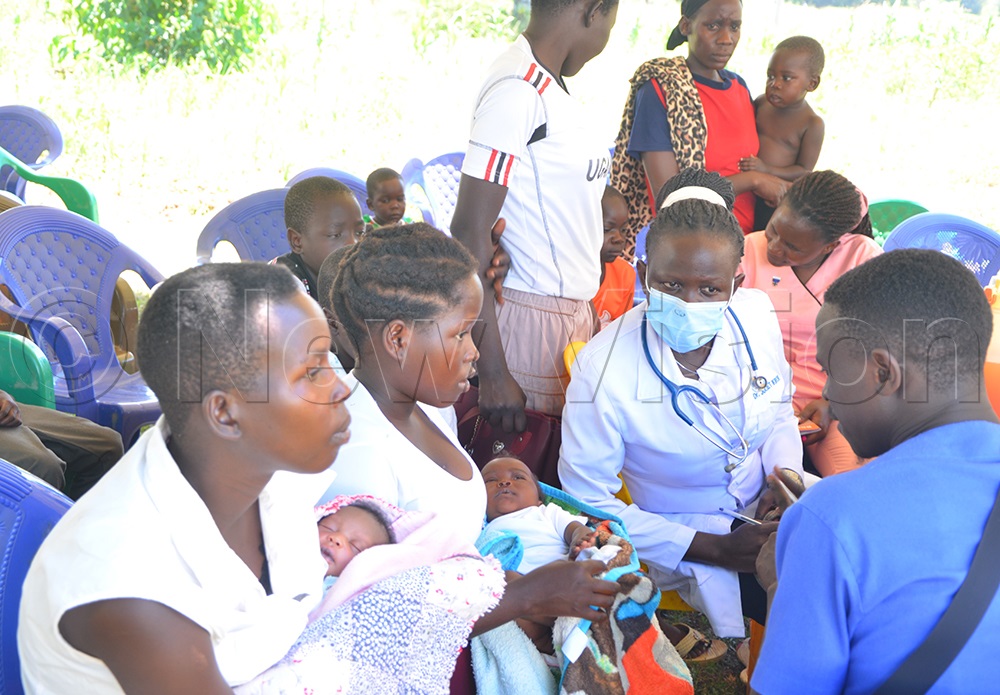Growing concerns in Teso as sickle cell disease cases rise
The current data from Soroti Regional Referral Hospital, which caters to the entire Teso area, reveals a dramatic increase in cases being handled at their sickle cell clinic. In 2020, the number of patients ranged from 100 to 200; now, that figure has more than tripled.
Dr George Olupot. (Credit Delux Emmy Alomu)
_________________
Medical professionals in the Teso region say they are increasingly getting worried over the surge in sickle cell disease cases among children.
The current data from Soroti Regional Referral Hospital, which caters to the entire Teso area, reveals a dramatic increase in cases being handled at their sickle cell clinic. In 2020, the number of patients ranged from 100 to 200; now, that figure has more than tripled.
Victoria Irebu, the data manager for the clinic, reported that the current number of children affected by sickle cell disease has reached 1,500, with over five new cases presented daily.
Irebu pointed out that the impact of the disease is heavy on many families. Every Thursday, the clinic sees between 100 and 150 clients seeking medications like folic acid, Fansidar, and hydroxyurea to manage their conditions.
The clinic also conducts free screenings for sickle cell disease, particularly targeting children in the wards. However, healthcare professionals believe this number only represents a fraction of those affected, with many unregistered children likely suffering from the disease.
Awareness efforts, including health camps organised by various groups such as Rotary clubs, have started to encourage more people to come forward for screening.
Dr Juliet Ikiror of Mbale RRH interacting with mothers who had brought their children for sickle cell screening during the Kapir Medical camp, Ngora on Saturday. (Credit: Delux Emmy Alomu)
These concerning statistics have prompted doctors to caution young individuals looking to marry or start families. They recommend screening for sickle cell disease before making any commitments.
Dr George Olupot, a paediatrician at Soroti Hospital, attributed the rise in cases to a lack of information within the community.
The paediatrician noted that some children are losing their lives due to drug shortages and a lack of available blood for treatment, where he emphasised the necessity of taking preventive measures seriously.
Olupot urged the Government to prioritise screening for those planning to marry or have children, to help identify potential carriers of the sickle cell gene.
“It is essential to ascertain your child’s health if they appear sickly, anaemic, or hypersensitive to cold. Bring them in for screening to check for sickle cell disease,” he advised parents.
Medical camp
These concerns came to light during a two-day free medical camp organised by the Rotary Club of Ngora in collaboration with the Rotary Club of Kampala, held at Kapir Health Centre III in Ngora District over the weekend.
Many children who attended the screening tested positive for sickle cell and were subsequently connected to care at Ngora Health Centre IV.
Dr Juliet Ikiror, a medic working in the children's ward at Mbale Regional Referral Hospital and a committed Rotarian, raised a critical concern regarding the paediatric ward's overwhelming influx of children suffering from sickle cell disease. This issue extends beyond the Bugisu region, impacting families from Teso and other areas as well.
Ikiror expressed her deep sorrow over the plight of these children, many of whom endure significant challenges due to their condition. "These children are chronically in pain and relying on medication for relief," she remarked with a heavy heart.
Screening is key
She urged stakeholders to prioritise sickle cell screening before childbirth, emphasising that these tests are often offered for free at many health facilities.
She pointed out that while the importance of HIV screening before marriage is widely recognised, sickle cell screening also deserves equal attention, as it currently has no cure, only management strategies.
"This rising burden is straining families—parents spend countless hours in hospitals, losing jobs and facing the stigma of the condition. Let’s work toward creating a community free of sickle cell disease," she implored.
Ikiror encouraged parents to take their children, especially those showing symptoms like painful swelling in their hands and feet, for early testing to ensure timely intervention.
Edith Ruth Angura, an individual living with sickle cell disease, emphasised the importance of a nutritious diet, particularly the inclusion of green vegetables and fruits, which can help these children live longer, healthier lives and achieve their aspirations.
Godfrey Apusan, president of the Rotary Club of Ngora, noted that sickle cell disease has drawn considerable attention during their medical camps because such services are often not easily accessible to the community.
Ben Omiat, a resident of Omuriana village in Kapir, highlighted the significance of health camps in raising awareness and facilitating screenings. He suggested that sickle cell tests should be conducted in a similar manner to earlier HIV/AIDS tests by health professionals visiting villages.
Janet Aunyo, a resident of Omiito village, reflected on how awareness of sickle cell screening has improved over time, contrasting it with earlier days when such measures were less prioritised.
John Bosco Okapet from Atapar village in Agule parish said the disease poses significant challenges for affected children.
In Africa, many children suffering from the most severe form of sickle cell disease (SCD) tragically do not survive past the age of five, often succumbing to infections or severe blood loss. In Uganda, it's reported that 70% to 80% of afflicted children face this fate before reaching their fifth birthday.
Eastern Uganda bears a particularly heavy burden from sickle cell disease, and research shows the prevalence of sickle cell trait (SCT) can reach 17.5% in this region, in contrast to 13.4% in other areas of the country. Each year, an estimated 20,000 to 25,000 newborns in Uganda are diagnosed with SCD.
Recognising the critical public health challenge posed by sickle cell disease, Uganda's Ministry of Health is prioritising efforts to enhance prevention and management strategies. This includes ramping up screening initiatives and improving access to essential life-saving medications.